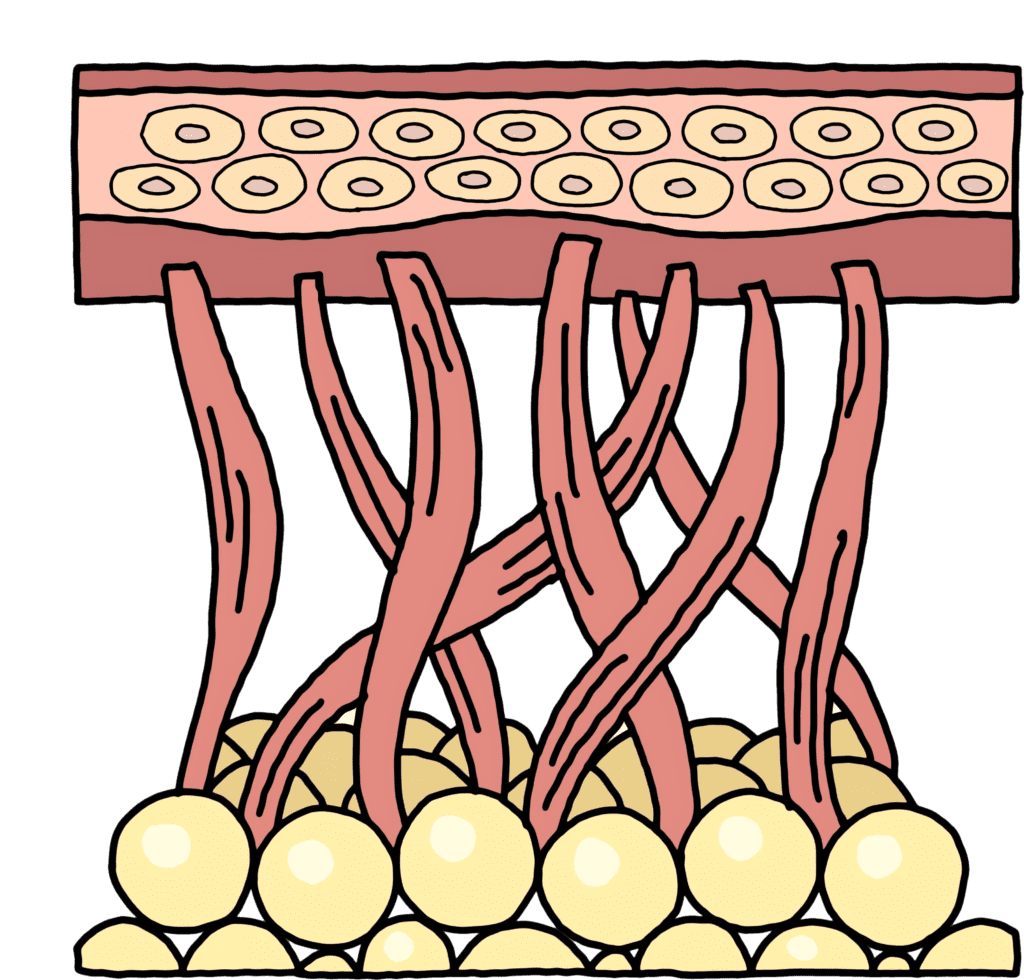Our skin is more than just an epidermis or a layer on our body. It is the largest organ in the body and when taken care of you can tell how healthy you are by simply looking at it. What really makes skin interesting are the skin imperfections where the wrinkle, the acne, the dark spot, etc. But this is just the tip of the iceberg; there’s a lot more secrets our skin keeps and thus what makes it truly fascinating. Among its many roles, skin’s resilience and elasticity depend on one superstar: collagen. For and regard, collagen is the protein that assists in maintaining skin firm, smooth and youthful. Known as the skin’s main supporting structure, collagen is the protein that provides the skin with physical appeal or support.
Collagen: The Skin’s Elasticity Champion
One of the tissues which demonstrate high prominence is collagen, which contributes to the elasticity of our skin. Just consider it like your skin’s personal trampoline—keeping everything tight, bouncy, and ready to take on gravity. Unfortunately, as we age, it’s like someone’s been cutting the springs one by one. When you are young, and your body naturally produces plenty of collagen to give your skin that young looking, tight skin. However, as you grow older the problem arises and the production of collagen reduces and the skin therefore loses its elasticity and begins to sag, wrinkle and develop fine lines. Still, after our 30s, the production drops, and by the time we are 40, the bodies generate a very small amount of collagen, which shows the effects of aging.
This decreasing in production of collagen is not limited to the skin appearing venerable, it also has to do with the way your skin works. Collagen is essential in your body for helping your wounds heal, providing your skin with the structural integrity and elasticity, and even regulating skin hydration. If collage production is low, our skin gets easily damaged, it sags, and often look pale with crusty dry patches. But what if we could reverse the process and persuade the skin that it is synthesizing collagen at the peak level? Can collagen really prevent aging or at least delaying it? Well, the good news is there’s a growing body of research showing that, yes, increasing collagen production can have important anti-aging effects.

Can More Collagen Prevent Aging?
Now that we know why is collagen in every skincare commercial and that the hype is real let’s look at the science behind it. The answer is not as simple as making a face mask out of collagen creams. Topical collagen products don’t stimulate the production of collagen in your skin. The collagen molecules are too large to penetrate deep into the dermis; that is where the collagen is produced. However, most of the collagen-based products promise to moisturise and plump the skin and improve the texture and appearance of the skin, but only for a short-term. So, if rubbing collagen on the face will not work for us, what is recommended in order to maintain or in fact increase collagen production as we age?

Boosting Collagen: Nutrition and Lifestyle
Our body is a natural collagen-factory, but we can give it a hand by boosting collagen production. The body can also produce collagen with the help of vitamin C, amino acids, and antioxidants you consume every day. As a well understood example, vitamin C is one of the essential components of collagen. Some of the best antioxidant sources and foods that can encourage collagen production include, oranges, strawberries, bell peppers, etc. Also, there are certain ways on to avoid causing any harm to your collagen; such as sun exposure that is known to cause the breakdown of collagen. The ultraviolet (UV) rays in the atmospheric really degrade the collagen fibers and inhibit further synthesis of collagen by the skin in its natural environment. Which is why here’s how sunscreen works magic when it comes to keeping your skin young and tight. Other daily practices that also maintain collagen includes not smoking because the smoke narrows the blood vessels and leads to less collagen production, and managing stress because cortisol, the stress hormone, degrades collagen. Keeping your body hydrate is also a crucial factor to protect your collagen from possible damages since it keeps your skin plump and supple.

Collagen Supplements: The New Fountain of Youth?
Collagen is naturally produced by the body, but supplements have emerged on the market as a promising game-changer in the skincare industry. These are sourced from animal or marine products and are saturated smaller chains that can easily be utilized by your body. A few scientific publications advise that taking collagen peptides can lead to an increase in human collagen production, enhance skin flexibility and help minimize skin aging effects such as wrinkles among other benefits.
Even though we are still in the middle of the research, some people who take collagen supplement daily say that their skin is smoother, more hydrated, and has fewer wrinkles. The purest form of collagen that has been found to be most effective is hydrolyzed collagen which is collagen that has gone through digestion to get a more easily absorbable size in the blood stream. In the form of powder or supplement, collagen peptides are slowly and steadily emerging as the perfect way to improve skin health from the inside.
The Future of Skin Care: Beyond Just Collagen
Though collagen continues to be the ace player in skin, it is not the only factor that is involved in the skin aging. Our epidermis is actually very complex, and it is comprised of our genes, the climate we live in and even our diets that determine how it progresses to age. Stem cell therapy and gene therapy are two of the many emerging technological solutions likely to see the light in the near future for treatment of damaged skin and skin repair at the cellular level. These treatments are intended to contain not only losses involving collagen but also skin cells, which might even help eliminate some symptoms of aging altogether.
But until those futuristic treatments become our reality, at the moment your best bet is a nourishing diet, proper protection from the sun, and a healthy lifestyle to ensure that collagen is produced naturally.

Final Thoughts: A Skin-Deep Science
So, is collagen really the answer of eternal youth? While it’s not a total magic bullet – yet collagen is a critical protein composition of the skin, and increasing collagen deposits is bound to give people a younger looking, glowing skin. As we continue to learn more about how our skin works, one thing is clear: it is the best way your skin looking best to you do take good care of your skin in the faces both inside and out. But while you’re stocking up on creams, powders, and bone broth, just remember: your skin’s greatest allies are sleep, sunscreen and maintaining a healthy diet. After all, the classiest collagen serum wrapped in designer packaging will not help if you spend hours watching TV programs with harsh blue light.
And hey, if everything else doesn’t work out then just tell yourself that they are smile lines and wrinkles, they are simply the proof that you have laughed, frowned and live your life through. However, even if collagen cannot reverse aging entirely it will keep you bouncing back (literally) like a well-sprung mattress. Elasticity for the win!


My name is Meliha Çay, and I am currently a 3rd-year Bioengineering student at Marmara University. Writing has always been a passion of mine, and now I have the incredible opportunity to combine it with my academic field as the Content Manager for Biologyto. My mission is to make science accessible, fun, and engaging for everyone. At Biologyto, we aim to inspire a love for science through articles that are not only informative but also full of excitement and creativity. I hope to spark curiosity in others and help them explore the amazing world of bioengineering and beyond.





